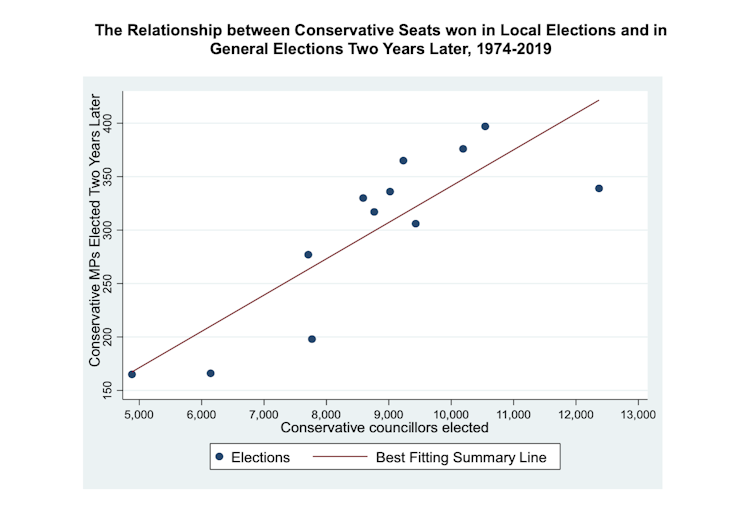The Conservatives ended up with a net loss of 487 seats in the May 5 local elections. Labour gained 108 and the Liberal Democrats 223.
The scale of the Conservative losses has led to speculation that prime minister Boris Johnson’s majority could be in jeopardy at the next general election – due to take place in 2024 at the latest.
It should be noted that turnouts are much lower in local elections compared with general elections and that local contests do not take part in all parts of the country at the same time. That means we are not comparing like with like here. However, historical data does suggest that when parties fare badly in a midterm local election, they do indeed go on to do badly in a general election.
What history shows
Historically, there has been a very strong relationship between the number of Conservative councillors elected and the number of Conservative MPs elected to the House of Commons two years later. For the 12 general elections since February 1974, the correlation between the two is very strong (0.84).

Why is this relationship so close? The principal reason is that there is a lot of inertia in electoral politics, even though volatility in voting behaviour is growing over time. Parties generally spend a long time in opposition before defeating the incumbent party of government in a general election. Local elections are the canary in the coalmine when it comes to signalling such defeats.
To illustrate this, when Labour won the October 1974 general election, it controlled 40% of the council seats in Britain. But by 1977, two years before Margaret Thatcher’s Tory victory in the 1979 election, it controlled only 28% of these seats. Equally, when John Major won the 1992 general election, the Conservatives controlled 34% of the council seats, but by 1995, two years before Labour’s landslide election win, it was only 21%.
What next?
The strong correlation means we can use the seat shares in the May 5 local elections to predict the seat shares in the next general election. If we analyse this relationship using a statistical technique called multiple regression, we find that for every 100 Conservative councillors elected in total this year we can expect about four Conservative MPs to be elected in two years time. This, of course, works in reverse, making it possible to forecast the effects of the loss of Conservative seats in local government this year on the party’s performance in a 2024 general election.
The forecast is that the Conservatives will win 243 seats in the House of Commons in that general election if the relationship holds up. In other words. they will lose 122 seats compared with 2019.
That said, there is a problem that the forecast is based on very few cases and so it is subject to wide margins of error. This error means that there is a 95% chance that the party will win between 193 and 293 seats in that election, so the prediction is not very precise. However, the important point is that even the most optimistic forecast of 293 seats won is well below the 326 seats needed to form a majority. It looks like British politics is in for another sea change in the next election.
Paul Whiteley receives funding from the British Academy and the Economic and Social Research Council
This article was originally published on The Conversation. Read the original article.







